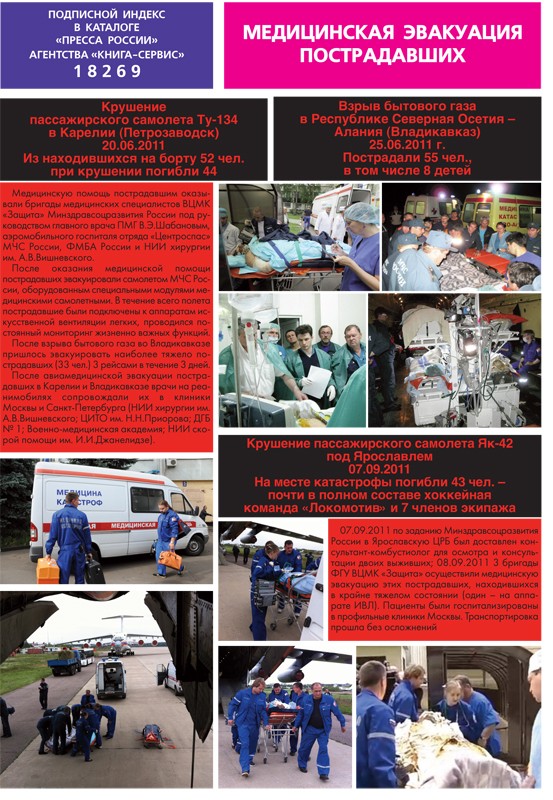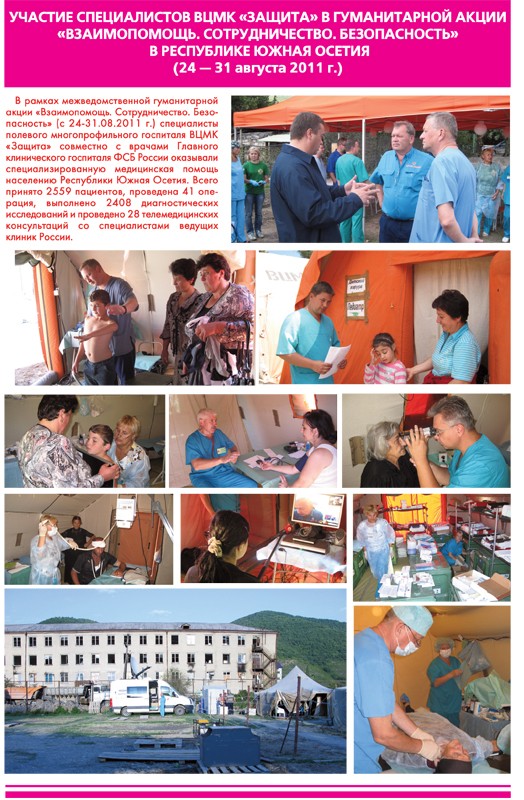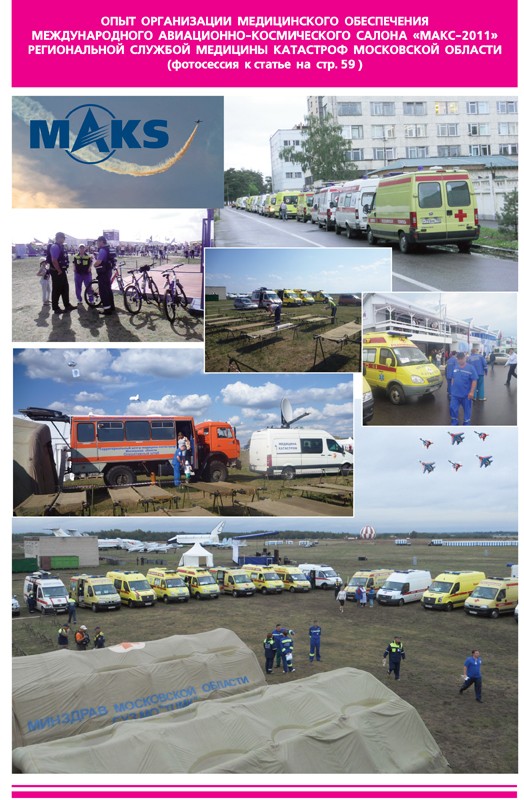ORGANIZATION AND TACTICS OF DISASTER MEDICINE SERVICE
1. Goncharov S.F. Innovative Technologies in System of Medical Support of Population Affected in Emergency Situations
The experience is presented of elaboration and introduction into the system of medical support of population in emergency situations of different innovative technologies. The main results of work of All Russian Service for Disaster Medicine in the field of development and introduction of new information and communication technologies, of technologies of decision formulation and decision making on the issues of liquidation of medical and sanitary consequences of emergency situations, of medical support of population in armed conflicts and in many other spheres of Service’s activity. The conclusion is drawn on the expediency of elaboration and introduction of innovative technologies into disaster medicine within the framework of implementation of federal target program on health service modernization.
Key words: All Russian Service for Disaster Medicine, armed conflicts, casualties, emergency situations, innovative technologies, medical support
2. Kostyuk I.I., Saveliev D.A., Khalezin Eh.S. Experience of Organization of Appraisal of Formations and Personnel of Service for Disaster Medicine of Omsk Oblast
The experience of organization of appraisal of formations and personnel of Service for Disaster Medicine of Omsk Oblast is presented. Procedures of territorial appraisal commission of the agency, the stages of appraisal and other issues are analyzed. The information on number of formations and personnel involved is given. Some directios of further training for facing emergency situations are discussed.
Key words: emergency situations, Omsk Oblast, personnel appraisal, service for disaster medicine, territorial appraisal commission of the agency, territorial center for disaster medicine
CLINICAL ASPECTS OF DISASTER MEDICINE
3. Yakhikhazhiev S.K. Surgical Care of Patients with Gunshot Wounds of Great Vessels of Limbs at Gudermes Regional Hospital of Chechen Republic during Armed Conflict in Northern Caucasus
The experience is presented of provision of surgical care to patients with gunshot wounds of great vessels of limbs at Gudermes Regional Hospital of Chechen Republic during armed conflict in the Northern Caucasus. The structure is analyzed of casualty contingent according to mechanism, character and localization of wounds and the prehospitalization delay. The diagnostics results and outcomes are discussed.
Key words: armed conflict, great vessels of limbs, Gudermes Regional hospital, gunshot wounds, surgical service, the Northern Caucasus
4. Matvienko V.V., Krestina L.S., Egorova I.A., Buchnov A.D., Rudnev A.I. Specifics of Organism Adaptation of Mountaineers and Rescuers to High-Altitude Climb Conditions
The specifics of organism adaptation of mountaineers and rescuers to high-altitude climb conditions are considered. The assessment is given of health status, cardiovascular fitness and physiological reserve of participants prior and after a high-altitude mission. Recommendations essential for higher efficiency of measures for maintenance of health and performance capability of rescuers in high-mountain environment are scientifically substantiated.
Key words: high-altitude climb, mountain rescuers, mountaineers, organism adaptation
5. Fedotov S.A., Tetyushkin M.A., Gus’kova O.V. Compliance Problems of Medical Professionals Engaged in Liquidation of Medical and Sanitary Consequences of Emergencies
The results are presented of a research aimed at estimation of incidence of psychic disorders among first-aid stations team members due to their engagement in liquidation of medical and sanitary consequences of emergencies and at appraisal of their readiness to seek medical attention in case of such disorders. The conclusion is drawn that in spite of high incidence and intensity of the disorders the level of compliance in the contingent is very low which demands elaboration and realization of measures to prevent, timely detect and treat the disorders.
Key words: anxiety syndrome and depression, compliance, first-aid stations personnel, liquidation of medical and sanitary consequences of emergencies, psychic disorders
6. Mingalev A.N. Regulatory and Adaption Capabilities of Servicemen in Armed Action Environment
A research is undertaken to measure the level of resistance to stress in servicemen judging by dynamics of parameters of cardiorespiratory synchronism under initial conditions and under stress factors when sent to armed action zones. Psychological methods were simultaneously used. Servicemen sent to armed action zones for the first time as well as battlewise ones were involved. The results of the research testify to the possibility of stress resistance assessment by parameters of cardiorespiratory synchronism.
Key words: armed action zones, cardiorespiratory synchronism, regulatory and Adaption capabilities, resistance to stress, servicemen
7. Bykov V.P., Makarov P.V., Chekalova M.V., Kugusheva A.Eh. Eye Traumas Caused by Pyrotechnicals
Specific characteristics of eye injuries by pyrotechnics are presented as well as outcome dependence on the type of pyrotechnical means and other circumstances of the accident. Diagnostics and management tactics of victims of fireworks are defined. The conclusion is drawn that pyrotechnic devices of classes 1 and 2 (Bengal lights and table-top fountains) cause mainly light injuries demanding out-patient treatment, while devices of classes 3 and 4 (rockets, firecrackers) may cause most severe injuries resulting sometimes in eye loss.
Key words: eye traumas, pyrotechnics
8. Agapov K.V., Bagdatieva M.G., Egorov M.S., Dzugkoeva F.A., Shutov A.A. Case-Report of Patient with Concomitant Mine-Blast Trauma Complicated by Development of Pancreatonecrosis
A case of treatment of a patient with a concomitant mine-blast trauma complicated by severe total pancreatonecrosis is presented. The peculiarities of diagnostics and treatment of the patient. It is pointed that the patient stayed in the hospital during 100 days and a part of diagnostic and treatment procedures were carried out after he left the hospital.
Key words: concomitant mine-blast trauma, pancreatonecrosis, peculiarities of diagnostics and treatment
9. Srednyakov A.V. Use of Alternative Prolongators of Topical Anesthetics in Environment of Mass Casualty Intake (the 2010 Haiti Earthquake)
The experience of use of alternative prolongators of topical anesthetics in managing victims of the 2010 Haiti earthquake. The advantages of the pain relief method are analyzed.
Key words: alternative prolongators, Haiti earthquake, lidokain solutions, topical anesthetics, victims, voluven solutions
MEDICAL ASPECTS OF ROAD TRAFFIC SAFETY
10. Fedotov S.A., Plavunov N.F., Kostomarova L.G., Potapov V.I. Organization of Medical Aid Provision to Victims of Road Traffic Accidents in Moscow
A complex presented of new organizational forms that enhanced promptness and efficiency of emergency medical management of road traffic accident victims in Moscow.
The efficiency of defining of zones of responsibility of city medical facilities in organization of aid to accident victims is analyzed. The evaluation of use of helicopter medical team in the system of road traffic accident victims management is done.
Key words: automated navigation-dispatch system of mobile teams control, casualties, emergency medical management, first-aid station, health service facilities, helicopter medical team, road traffic accidents, zones of responsibility
11. Zhukov I.Yu., Mitin I.N. Psychological Indicators of Poor Prognosis of Accident-Free Driving
The necessity of use of psychodiagnostic methods for evaluation of psychophysiological status of professional drivers during their medical survey is substantiated. The experience of the evaluation of psychophysiological status of professional drivers differentiated with respect to accident history, age and professional grade is analyzed. Ways of enhancing of medical support of road safety by detecting people with poor prognosis of accident-free driving are suggested.
Key words: accident-free driving, drivers, poor prognosis, psychophysiological adaptation, psychophysiological indicators, psychophysiological occupational selection, road traffic safety
12. Kozlov E.V. Psychophysiological Aspects of Driver Training: Evaluation of Knowledge and Recommendations
The results of interviewing of 147 candidates for driver job right after their completion of driver training center course are presented. A conclusion is drawn on need of substantial changes in the system of their preparation in psychophysiological aspects of driving.
Key words: drivers, occupational reliability, psychophysiological aspects of driving
SANITARY-ANTIEPIDEMIC (PREVENTION) MEASURES IN EMERGENCIES
13. Karniz A.F., Kostyuchenko O.M., Gurcalo V.I., Zheleznyak V.N., Sibilev D.V., Sobol’ V.I. Use of Expert Judgement Method for Evaluation of Health Service Facilities’ Readiness for Management of Biological Threats
A method of expert judgement for evaluation of health service facilities’ readiness for management of biological threats is presented. A procedure of forming of groups of experts, the issues for group expertise, content and order of use of expert judgements are discussed.
Key words: biological threats, expert judgement method, health service facilities
14. Suranova T.G. Specifics of Organization of Health and Epidemiological Supervision during Floods
Specifics of organization of health and epidemiological supervision during floods are presented. The experience of liquidation of epidemiological consequences of the 2002 catastrophic flood in Southern Federal District is discussed.
Key words: floods, health and epidemiological supervision, infectious diseases, prophylaxis
ACTUAL PROBLEMS OF SPECIALIZED (AEROMEDICAL) EMERGENCY MEDICAL CARE
15. Filippov A.Yu., Popov A.S. Perfection of Records and Accounting Documents on Aeromedical Evacuation of Emergency Situation Victims
A packet of new records and accounting documents on aeromedical evacuation of emergency situations victims elaborated by specialists of All Russian Center for Disaster Medicine “Zaschita” and “Centrospas” unit in 2008-2010 is presented.
Key words: aeromedical evacuation of victims, new records and accounting documents
EDUCATION AND TRAINING OF PERSONNEL
16. Zhukov V.A., Ryabinkin V.V. Postgraduate Preparation of Cadres for Service for Disaster Medicine of Federal Districts and Main Directions of Training Activity of Institute of Disaster Medicine Problems at All Russian Center for Disaster Medicine “Zaschita”
The present state of postgraduate preparation of doctors for Service for Disaster Medicine at central and local bases of Federal Districts of Russia in 2010 is analyzed and main directions of training activity of Institute of Disaster Medicine Problems at All Russian Center for Disaster Medicine “Zaschita” for near term up to 2016 are formulated.
Key words: directions of training activity, Institute of Disaster Medicine Problems, medical cadres, postgraduate preparation, service for disaster medicine
17. Porotikov V.T., Katik A.A. Experience of Training Personnel of Services Engaged in Liquidation of Consequences of Road Traffic Accidents in First Aid Practices
The experience of Khabarovsk Territorial Center for Disaster Medicine in training personnel of services engaged in liquidation of consequences of road traffic accidents in first aid practices is presented.
Key words: first aid practices, Khabarovsk Territorial Center for Disaster Medicine, preparation and training activity, road traffic accidents
IN ORDER OF DISCUSSION
18. Lobanov A.I. Legal and Practical Issues of Health Protection of Population in Emergency Situations
Legal and practical issues are discussed of health protection of population in emergency situations in connection with 2009 changes in federal law on basics of health protection of Russian citizens. The conclusion is drawn that for elimination of all legal and practical inconsistencies an urgent revision at an interagency level of legal and regulatory framework on the whole issue of medical support of victims of emergency situations is necessary.
Key words: emergency situations, legal and regulatory framework, medical support of population
SHORT REPORTS
19. Peshkun A.V. Risk Factors of Road Traffic Accidents and their Medical and Sanitary Consequences
Risk factors of road traffic accidents and their medical and sanitary consequences are presented. The unsolved problems of medical aid rendering to accident casualties are brought to notice.
Key words: casualties, medical and sanitary consequences, risk factors, road traffic accident
INFORMATION
20. Experience of Organization of Medical Care Provision at International Aviation and Space Salon MAKS-2011 by Regional Service for Disaster Medicine of Moscow Oblast




